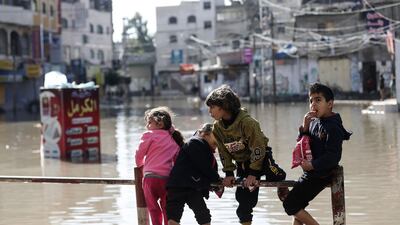Heavy rains and cold temperatures gripped the Eastern Mediterranean on Sunday, as the Levant faced the strongest cold front yet this winter.
In the first of two cold fronts expected this week, rains continued in Israel, Palestine, Jordan and much of Syria and Lebanon, with weather expected to stabilise later in the day.
Scattered showers were reported in Tel Aviv, one day after heavy rains flooded roads and killed two people.
On Saturday, two people in Tel Aviv drowned in a residential building after heavy rains flooded an elevator, Haaretz reported.
Israeli emergency rescuers using scuba gear attempted to rescue a man and a woman trapped in an elevator stuck at basement garage level after automatically locking due to an apparent electrical shortage; the man died at the scene and the woman later died of hypothermia at the hospital, Haaretz reported.
Eleven others were injured on Saturday across Tel Aviv, which received 20 per cent of its annual rainfall within a few hours.
There were no further injuries or flooding reported on Sunday.
In Gaza, heavy rains that flooded streets on Saturday cleared on Sunday, as rainfall headed eastward, bringing temperatures down to 5°C and scattered showers in Jerusalem, Bethlehem, Hebron and Ramallah, according to the Palestinian Meteorological Department (PMD).
The PMD warned of floods forming in valleys and low-lying areas, slippery roads and poor visibility in the West Bank on Sunday.
After freezing rain and temperatures of 5°C early Sunday morning, rains lifted in Damascus, with temperatures warming in the Syrian capital to 11 °C
In Amman and much of Jordan, residents woke up to thick fog and heavy reducing visibility on the roads as cold rains dropped temperatures as low as 3°C with highs in the kingdom in single digits.
Fog formation and concern of flooding led to the delay of schools and working hours until late morning in the towns of Ajloun, Mazaar, Tafilah, Maan and Shobak.
On Sunday, Jordan’s Civil Defence Department issued alerts renewing its warning to the public to take precautions during the cold front, urging citizens to avoid valleys, flood plains and areas where torrents may form.
A second cold front is expected to hit the Levant late Tuesday or early Wednesday, which will bring heavy rains and high winds to Palestine, Israel, Jordan, Lebanon and Syria- with forecasts of potential snowfall in hilly areas.
A lack of preparation and warning for sudden, heavier-than-normal rainfall and storms that struck the Eastern Mediterranean in winter 2018 and led to several deaths in the Levant, particularly in Jordan.
Last year, more than 25 Jordanians died in various floods due to heavier-than-normal, sudden and intense rainfall meteorologists and environmental experts attribute to climate change.
The rains also submerged half of Amman’s downtown and Roman Theatre, causing millions of dollars of damage to local businessmen. The Greater Amman Municipality is in the final stages of new drainage systems in the downtown area, which lies in a valley cutting through the center of the hilly capital.
Last year’s storms also led to deaths of refugees and displaced persons in southern and northern Syria, many of whom are exposed to the elements and in temporary shelters erected on flood plains. International humanitarian agencies renewed their calls for concern over the past few days.
“Plummeting temperatures threaten to exacerbate an already dire situation for thousands of families,” the IRC warned in a statement last week. Noting that “thousands of people- including children- are living in the open air under olive trees” in Idlib, the organisation highlighted the need for shelter, fuel and warm winter clothes.
In a security council briefing last month, the UN Office for the Co-ordination of Humanitarian Affairs (OCHA) warned that “rain, cold and winter conditions have compounded hardship for many displaced families and their host communities” in northwest Syria, noting that access to Rukban camp between Syria and Jordan, where a dozen children died from the cold last year, remains restricted to aid agencies.

